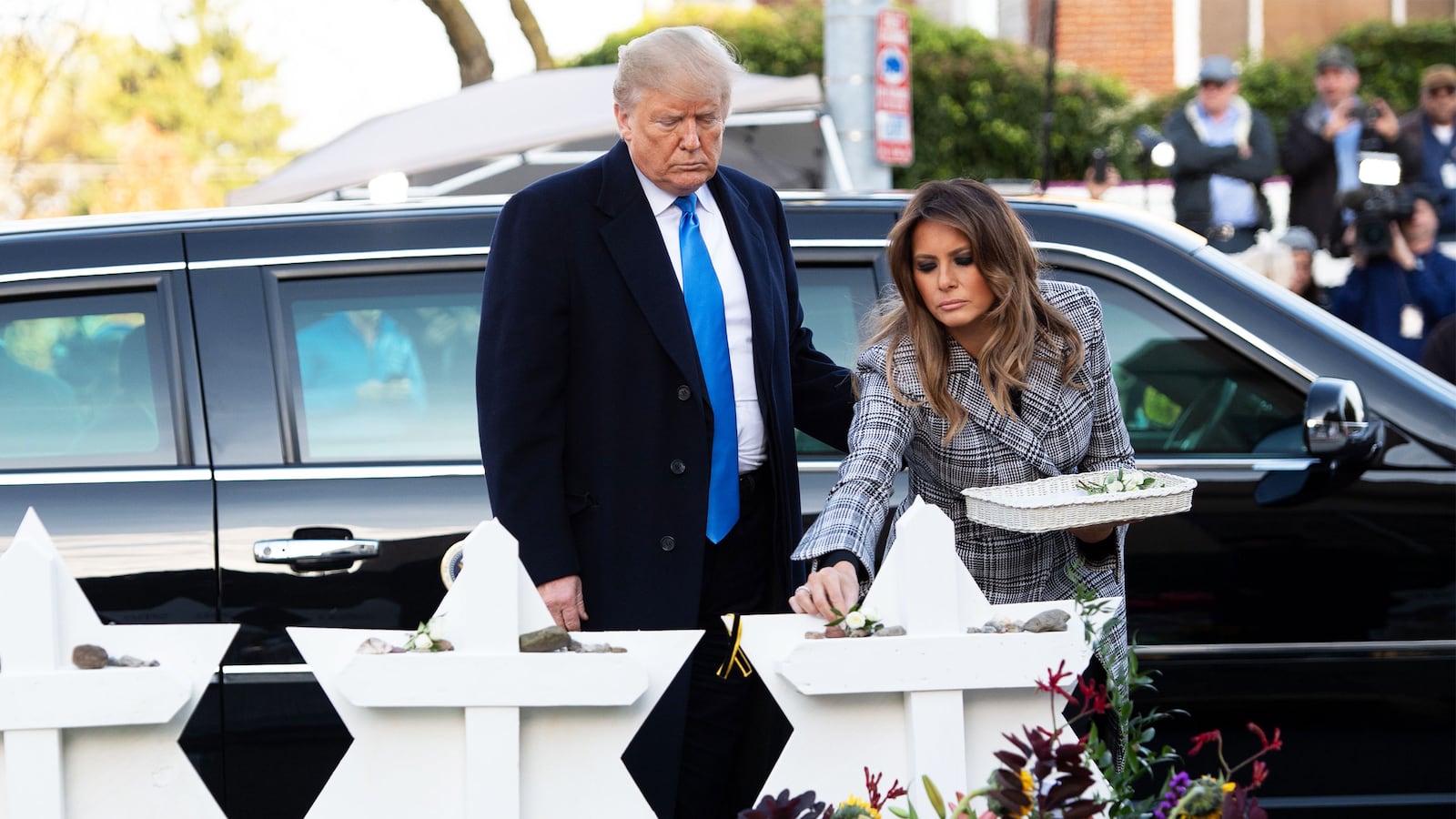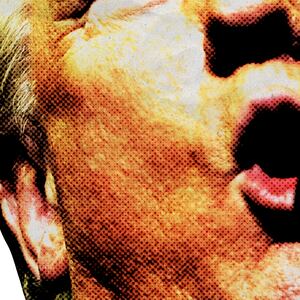No human being is perfect. We all make mistakes, and look back on our actions, occasionally, with remorse.
From this ineluctable fact of human life, arguably, springs one of the sources of religion itself: the knowledge that we cause harm, deliberately or inadvertently, and we feel sorry, and we don’t know what to do. Elaborate theologies of sin and forgiveness, reward and punishment, issue from this brute reality of the human condition.
But not Donald Trump.
What I, and I think many Jews, wanted to hear from President Trump, as he visited the site of the worst massacre of Jews in American history, was, if not an outright apology, at least some taking of responsibility, some expression of remorse.
What we got, publicly least, was bupkes: nothing.
Remorse for what? For not condemning white supremacy except when pushed to do so. For occasionally supporting it outright, through retweets and race-baiting. For exaggerating the dangers of immigration to win votes. For stirring up hatred and rage at a series of otherwise pointless rallies and in thousands of incendiary tweets. For tolerating among his supporters both overt and covert anti-Semites, and occasionally dog-whistling to them with ads targeting George Soros or Michael Bloomberg. For spinning baseless conspiracy theories, attacking the media, and attacking Hollywood—all of which are fodder for the worst of anti-Semitic imagination. For allowing anti-Semitic attacks to rise 60 percent between 2016 and 2017 and failing to take a single action to counteract them.
If not all that, could he at least express remorse over his baseless claims about the “migrant caravan”: that there are Middle Easterners among the refugees, or gang members among the refugees (who are, in large part, fleeing gangs), or that there is an invasion paid for by shadowy figures? Alleged synagogue attacker Robert Bowers says the caravan conspiracy was his immediate impetus to murder. Does Trump really not regret promoting it? Not a little?
Honestly, the content feels almost secondary. It would have been nice to hear Trump say “I regret some of my language about refugees,” but the specifics would have been less important than the admission that, like every other human being on the planet, Donald Trump occasionally regrets things he said and didn’t say.
But no. Visiting Pittsburgh in the wake of the massacre, Trump spoke only privately. In recent days, he has condemned anti-Semitism as if he had not suborned it all these years, and condemned other people for the attack, rather than admitting it was his movement (albeit not his follower, in this case). In other words, he has said some of the right things, but refused to take any personal moral responsibility. This is insufficient.
It’s not like saying sorry should be so anathema to a U.S. president. Harry Truman said, “the buck stops here.” Not “it’s the media’s fault and I didn’t do anything.”
Indeed, human beings’ inability to live up to our ideals is fundamental to all streams of Christianity and my own Jewish tradition, among others. Whether in confession, or prayerful conversation, or the drama of Yom Kippur, apologizing is part of being human.
Does Trump not bear any responsibility for Pittsburgh? Not even one percent? Half of one percent? Did he not contribute anything, in all his bombast, hyperbole, and scapegoating, to the climate of rage and mistrust that now blankets the country like smog?
Does he not regret, even a little, saying that there were “good people on both sides” of the neo-Nazi rally in Charlottesville? What good people march with Nazis?
Or, if you prefer policies to posturing, does Trump now regret cutting the Department of Homeland Security’s “Countering Violent Extremism” program, which might have reached the likes of Cesar Sayoc and Robert Bowers, or at least prevented some of the hateful messages they absorbed? Or not filling the office of special envoy to monitor and combat anti-Semitism until 19 months into his presidency?
This is what grieving Jews need to hear. Not more evasions and disclaimers and gaslighting, but finally, at long last, some taking of responsibility. We need to hear that we’re not insane, that anti-Semitism has gotten worse on Donald Trump’s watch, that he bears some responsibility for it happening. We are yearning to hear this.
And if not from Trump, who seems congenitally incapable of such reflection, then perhaps from his supporters. Where are you, Mike Pence? You are a religious man, with both Catholicism and Evangelical Protestantism in your faith practice. When you search your heart, do you really find no cause for repentance? Did you do nothing that might have encouraged Robert Bowers to commit an act of mass murder?
Do you, Mr. Pence, even apologize for having a “messianic rabbi”—i.e. a Christian whose mission it is to convert Jews—say a prayer over our dead in the name of “Savior Yeshua”? This was a hideous disrespect to the deceased.
Not only have Trump and his supporters failed to take any responsibility, they have shifted the blame on others and perpetuated the very cycles of hatred that made these acts of domestic terrorism inevitable. Trump once again called the media “the enemy of the people.” He suggested that the synagogue itself was at fault for having inadequate security (even though the gunman, armed with an AR-15, managed to shoot four fully armed police officers).
His adviser Kellyanne Conway even attributed the massacre to “anti-religious” motives, even though Bowers was quite clear that he killed 11 Jews because of the “migrant caravan” and the pro-refugee activities of the Hebrew Immigrant Aid Society, or HIAS. How much clearer can a terrorist be?
We all know that Trump does not excel at self-reflection. When CNN’s Wolf Blitzer asked Trump in 2016 what he would say to his anti-Semitic supporters—who, at the time of the question, were deluging Jewish journalists like me in viciously anti-Semitic tweet storms—he replied that he had nothing to say to them. He has said he has no regrets for saying John McCain was not a war hero or for praising a politician who body-slammed a reporter. (In fairness, Trump did say that he regretted not firing FBI Director James Comey sooner.)
Maybe to Trump, admitting you made a mistake looks like weakness. But it’s not weakness, Mr. President. It’s humanity.







